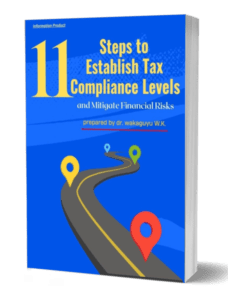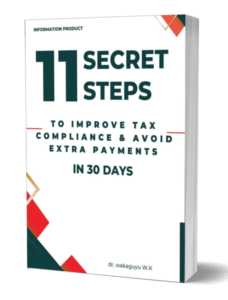Is your Church tax Compliant? In this post, we are going to discuss how to ensure that the Church is tax compliant. We will go through seven Important steps that will help you and your church to stay tax compliant while navigating the complexities of the tax laws.
a. Affiliate Disclosure: These are affiliate links from which we receive a commission at no cost. Read full Affiliate marketing disclosure HERE.
b. Tax Contents Disclaimer: The tax industry in Kenya is very dynamic. The tax contents in the posts are not professional advice. Read full disclosure HERE.
We are going to examine 7 steps that the Church should already be taking to comply with tax laws. The following are the 7 steps. Number 7 will surprise you.
Step 1: Have Proper Tax Records and Documents
Have in place all the required and accurate tax records and documents. They are essential for tax compliance. There are three critical activities that you should do:
- Keep the tax records and documents.
- Maintain tax records and documents.
- Retain the tax records and documents.
In addition, you need to do the following.
- Establish an accounting system to record payments, contributions, expenses, and income. B. Keep receipts,
- Regularly reconcile your accounts.
- Keep track of all financial activities.
Step 2: Separate Church and Personal Finances
There are many Churches that are operated by the Pastor and his/her spouse and there is no separation of Church money and personal money. To comply with taxes effectively and avoid money getting mixed up, it is important to maintain separate personal and church finances. This can be achieved by opening a separate bank for the church business. This will:
- Simplifies your tax reporting
- Ensures transparency.
Step 3: Understand Your Tax Obligations
The Church has certain tax obligations. It is important to ensure you and the other church leaders are aware of the specific tax obligations that pertain to churches. Some of the tax obligations are:
- Tax registration
- Paying employee taxes e.g. PAYE
- Non-core business income taxes e.g. income tax, VAT, domestic excise duty.
- Filing correct tax returns on time.
- Remitting the correct amount of tax on time.
- Complying with state laws.
This will help the church avoid tax fines, penalties, interest, prosecution or jail time.
Step 4: Seek Professional Services
Navigating tax compliance can be challenging especially because the majority of Church leadership are not tax experts. It is advised to get professional help. Speaking with a tax professional who specializes especially in nonprofit or religious organizations is advisable. Under certain circumstances, it is advisable to have them onboard. They may help you with:
- Personalized tax advice.
- Ensure tax compliance.
- Assist you make prudent financial decisions.
Some of the tax professionals that you can consult are:
- Tax auditors.
- Tax accountants.
- Tax advisors.
- Tax consultants.
- Tax lawyers.
- Tax coaches.
Step 5: Train and Inform Staff and Volunteers
To ensure tax compliance, providing tax training and information to your church’s staff and volunteers working especially in the accounts and tax department is paramount. The staff and volunteers should have information about:
- All tax obligations.
- Any tax exemptions.
- Special documentation required.
- Updates to tax laws.
Step 6: Conduct Regular Internal Audits
A Church does not have to wait for the end of the financial year to conduct an external audit. Internal audits conducted on a regular basis are recommended.
This will help confirm the following:
- Tax compliance
- Identify any potential issues or anomalies in Church financial operations.
The internal audit should concentrate on:
- Review in detail your internal controls,
- Financial records, and
- Tax law compliance.
Internal audits assist your church’s financial operations in upholding honesty and integrity.
Step 7: Stay Up-to-Date with Tax Law Changes
Tax rules and regulations may evolve over time. Watch out for any changes to the tax laws and especially during the national budget. Some of the changes may affect tax compliance by Churches. To stay current with developments that may affect your church’s tax, the following are four things that you can do:
- Become a member of relevant professional associations.
- Subscribe to reputable tax publications.
- Attend seminars or workshops by professional associations
- Attend tax conferences.
Conclusion:
By following these seven steps, your church may create a solid basis for tax compliance. Step 1: Have Proper Tax Records and Documents
Step 2: Separate Church and Personal Church Finances
Step 3: Understand Your Tax Obligations
Step 4: Seek Professional Services
Step 5: Train and Inform Staff and Volunteers
Step 6: Conduct Regular Internal Audits
Step 7: Stay Up-to-Date with Tax Law Changes
Together, let us ensure that your church can continue serving the community while complying with tax laws.
Thank you for reading the post.
Dr. Wakaguyu W.K.
Disclaimer: This post is only intended to provide information and should not be taken as legal or other professional advice. It is essential to consult a qualified tax professional or lawyer in order to manage your church’s particular circumstances and ensure adherence to the relevant tax rules and regulations.
Dont leave without an information product







